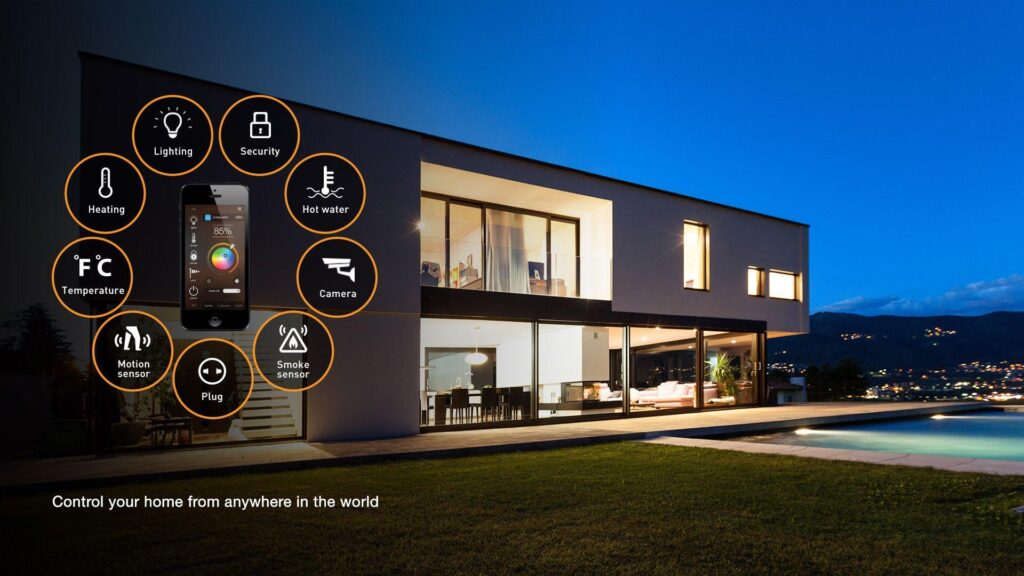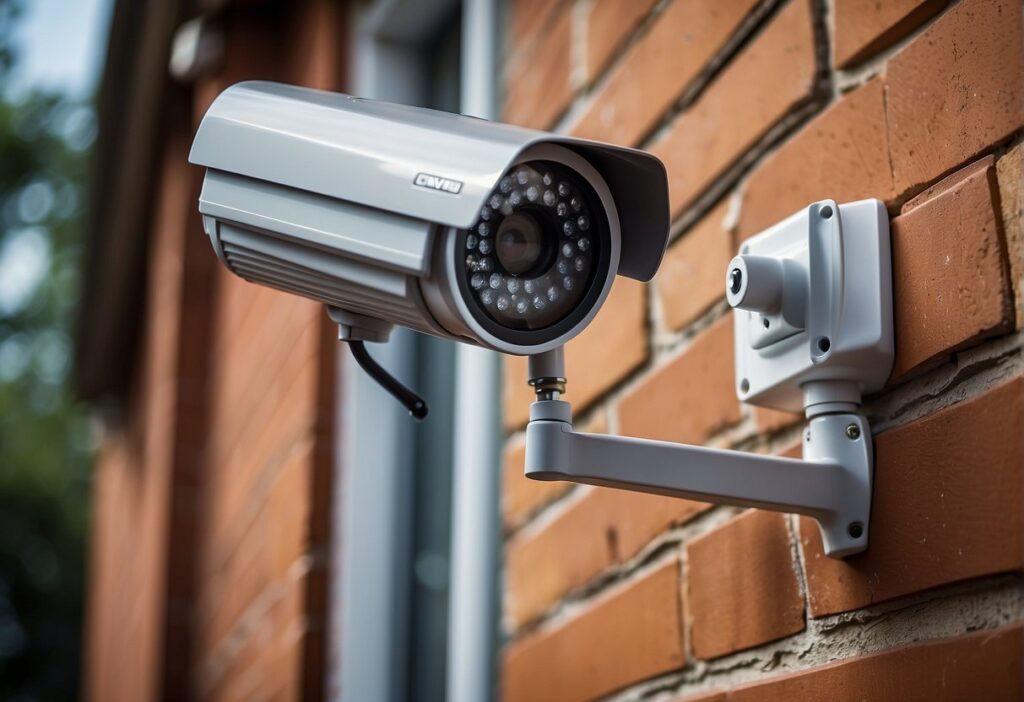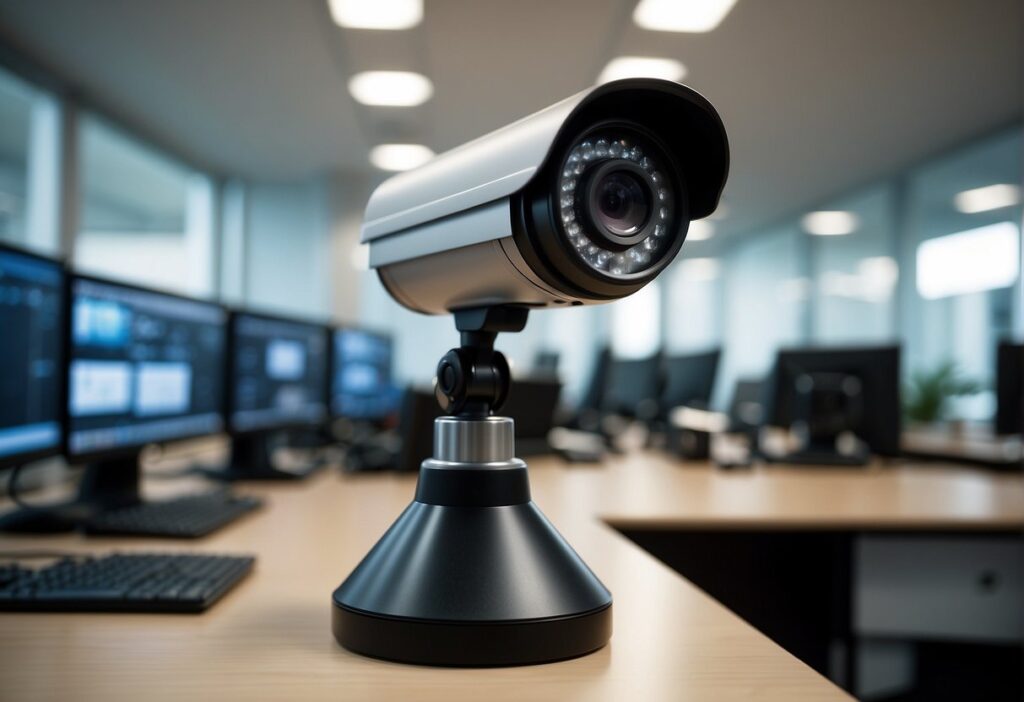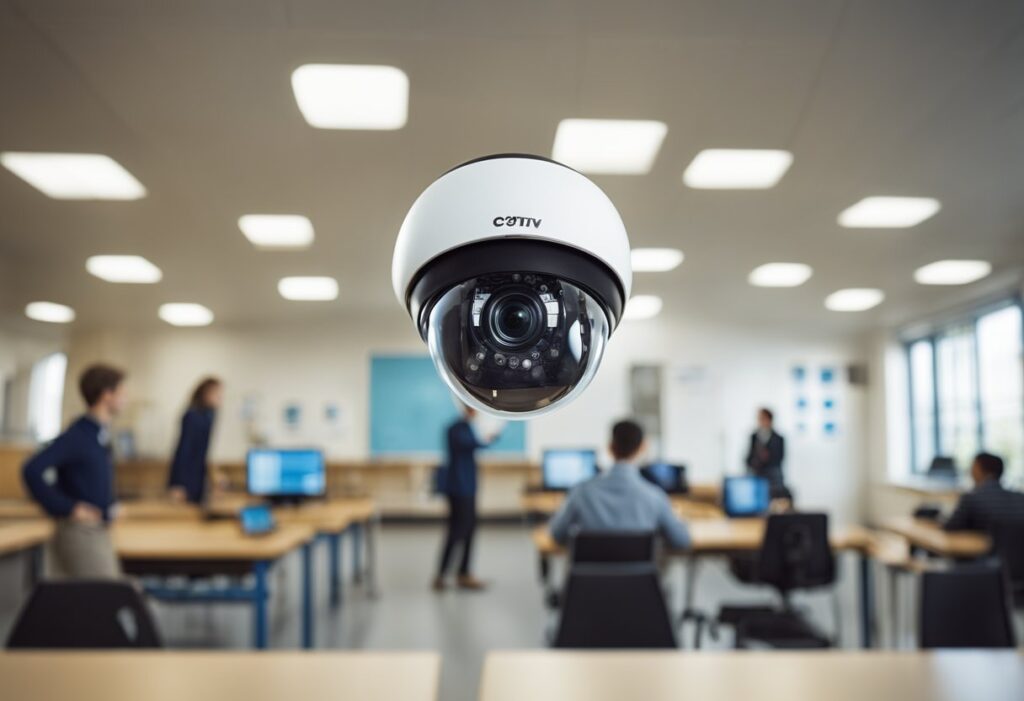Importance of Security Systems
In the digital age, the escalating integration of our personal and professional lives with technology heightens the need for advanced security systems, not only as a deterrent to intruders but also for the peace of mind of families and property owners.
These systems, evolving with features like motion detectors, surveillance cameras, and smart integrations, are essential in ensuring safety and business continuity, adapting to increasingly complex security challenges.
Key Takeaways
- Security systems are essential for protecting assets, information, and people.
- Technological advancements have made modern security systems more comprehensive.
- Effective security systems are key to preventing loss and maintaining continuity.
Importance of Security Systems: The Role of Security Systems
Security systems serve as a critical element in maintaining safety and protection by discouraging criminal behavior, limiting access to authorized individuals, and dispatching alerts during emergencies.
Deterrence of Criminal Activity
A primary function of security systems is the deterrence of criminal activity. They are visible indicators that a property is protected which can discourage potential burglars from attempting entry.
The presence of cameras, alarm systems, and signage stating that security measures are in place can be a powerful deterrent to crime.
These systems are on the frontline when it comes to the prevention of unauthorized access. They range from basic lock-and-key mechanisms to complex biometric systems that grant access based only on personal identification methods, effectively keeping intruders at bay and allowing entry only to those with explicit permission.
Detection and Alerting for Emergencies
In the event of an unauthorized entry, security systems can detect the intrusion and immediately alert property owners or the police. Modern systems also detect environmental dangers such as smoke or carbon monoxide, quickly alerting occupants and emergency responders to protect against fire hazards and other emergencies.
Key Components of Modern Security Systems
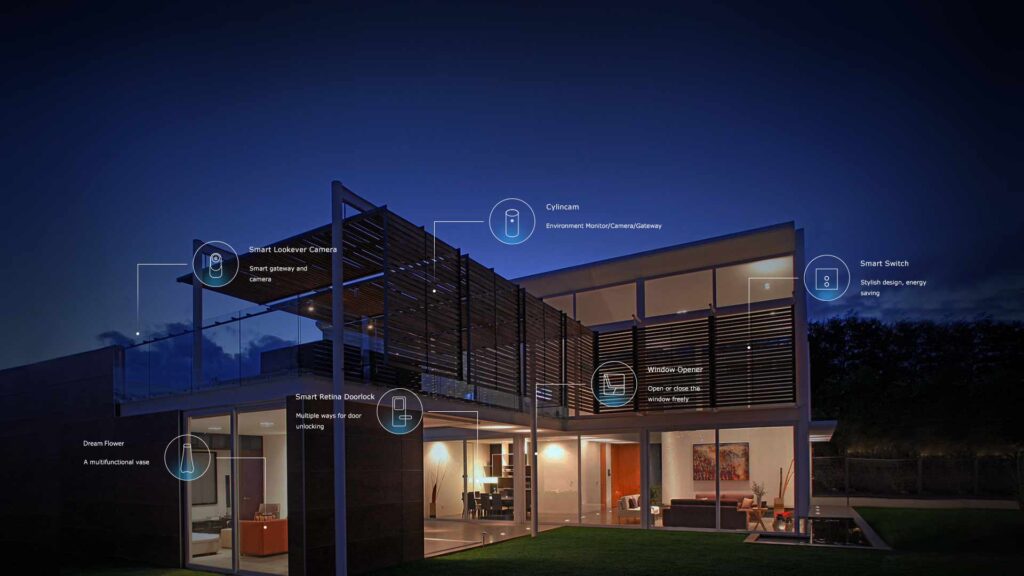
Modern security systems leverage sophisticated technology to protect assets and individuals. They incorporate a variety of interconnected components designed to detect, deter, and document security breaches.
Alarm and Surveillance Systems
Alarm and surveillance systems form the crux of modern security. Surveillance cameras provide real-time video surveillance, capturing footage for evidence and enabling remote monitoring.
These systems often use both indoor and outdoor security cameras that can be monitored via smartphones or central stations. Alarm systems, on the other hand, use audio and visual signals to alert when an intrusion is detected, which can be vital in summoning immediate assistance or scaring off intruders.
Intrusion Detection Sensors
Intrusion detection sensors act as the sensory organs of a security setup. Motion sensors detect movement within a protected area, providing an early warning of an intrusion.
Contact sensors are typically fitted to doors and windows to signal when they have been opened without authorization. The effectiveness of these sensors ensures that any unauthorized entry triggers an immediate response from the alarm system.
Access Control Mechanisms
Access control mechanisms are essential in regulating who enters and exits a space. These range from traditional locks to sophisticated electronic access control systems requiring a key fob or keypad entry.
They effectively restrict access to authorized individuals and record access attempts, which is critical in maintaining secure environments. Control panels are often the interface through which users interact with these systems, programming their preferences and monitoring their status.
Advancements in Home Security Technology
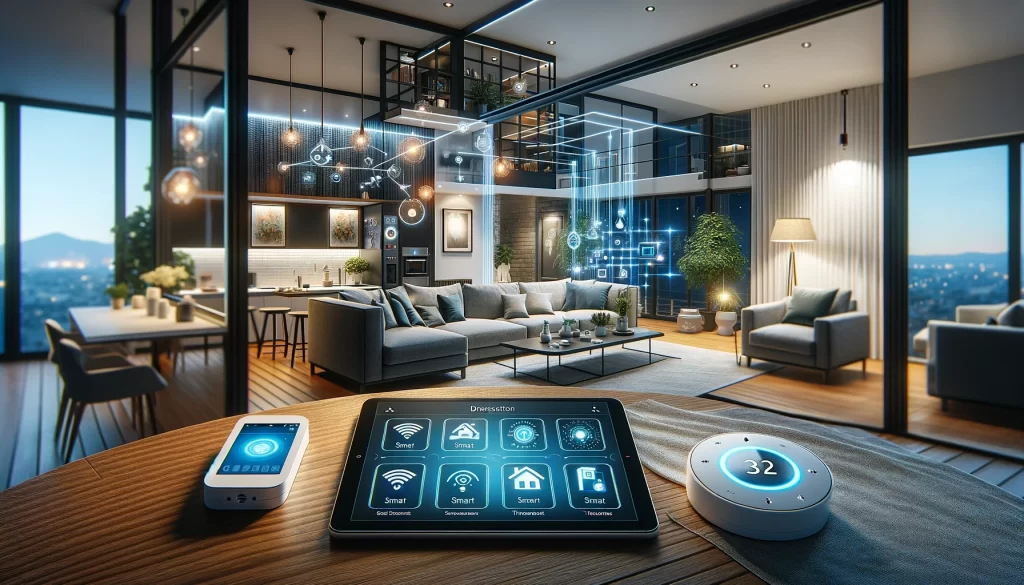
Recent technological strides have greatly enhanced the security of homes. Today’s home security systems offer sophisticated features for safety and convenience which were unimaginable even a decade ago.
Integration with Home Automation
The integration of home automation with security systems has revolutionized how individuals interact with their homes. Homeowners can now connect various devices, including smart lighting and smart thermostats, creating a cohesive system controllable from a singular platform.
This interconnectedness allows for preemptive responses to security breaches, such as lights turning on automatically if unusual activity is detected.
Remote Monitoring and Control
Remote access to home security has transformed the way security is managed. Homeowners can now remotely monitor their property via live streams from outdoor cameras or receive alerts directly to their mobile devices.
Control over the system extends to arming and disarming the system from any location, ensuring homeowners feel secure even when they are away from home.
Smart Detection Devices
Households nowadays are equipped with advanced detection devices that offer more than just traditional alarms. These include video doorbells that allow residents to see and communicate with visitors without opening the door and sensors that can differentiate between potential threats and benign stimuli.
The precision and intelligence of these systems greatly reduce false alarms and increase overall security efficacy.
Benefits of Security Systems for Property Owners
Security systems provide essential protection for property and personal assets while offering several significant financial and psychological advantages to property owners. They not only safeguard the premises but also contribute to the overall wellbeing of those who inhabit them.
Protecting Personal and Real Assets
Security systems are a critical measure in the protection of both personal and real assets, serving to deter theft and vandalism. For a property owner, the presence of a security system means that their tangible assets are monitored and less susceptible to criminal activities.
Technologies such as smart home security options play a crucial role in protecting valuables and can even alert authorities in the event of a breach.
Enhancing Peace of Mind
The psychological benefits of installing a security system are vast, engendering a sense of comfort and peace of mind. Knowing that their home safe and sound allows property owners to focus on their daily tasks without the constant worry of home safety.
This assurance is pivotal for the mental health of occupants, contributing to a more relaxed and secure living environment.
Insurance and Liability Advantages
Security systems may result in lowered insurance premiums as they significantly reduce the risk profile of a property. Insurers often recognize the protection a security system provides by offering discounts, acknowledging that the presence of a system can diminish claims related to theft or property damage.
Moreover, in the unfortunate event of an incident, having a security system in place can aid in the substantiation of insurance claims, making the process more streamlined for property owners.
Standards and Compliance in Security Installations

In the realm of security installations, adherence to recognized standards and compliance with ISO regulations is indispensable. They ensure interoperability of components, enable consistent quality, and affirm that installations meet stringent safety and efficiency criteria.
ISO Regulations for Security Systems
ISO regulations, such as ISO/IEC 27001, establish guidelines and practices for information security management systems (ISMS), safeguarding digital data from unauthorized access, loss, or corruption.
Compliance with these guidelines not only mitigates risk but also enhances trust in security systems from stakeholders. Certified security installations reassure users of their data’s integrity and privacy.
Governmental and Industry Standards
Government agencies set forth industry-specific security mandates, requiring compliance with standards such as the Federal Information Processing Standards (FIPS). These standards are paramount in areas affected by national security.
Industry standards, like those established by the Security Industry Association (SIA), drive innovation and ensure technical compatibility across devices. They reflect the collective expertise of industry stakeholders and evolve with technological progress and societal needs.
Professional vs. Self-Monitoring Security Solutions
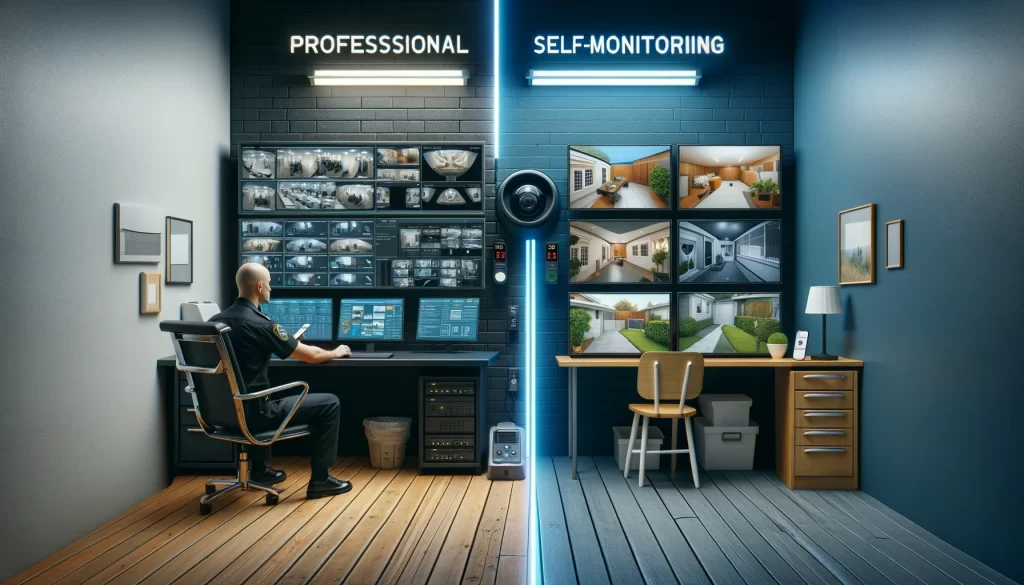
In the realm of home security, consumers have the choice between professionally monitored systems and self-monitoring options. Each approach has distinct advantages and limitations that cater to different needs and preferences.
Pros and Cons of Professionally Monitored Systems
Pros:
- 24/7 Monitoring: They typically offer around-the-clock surveillance by trained professionals, ensuring rapid response to alarms.
- Peace of Mind: With companies like Vivint providing these services, homeowners can be assured that experts are watching over their property.
Cons:
- Monthly Fees: This route can be costly due to recurring monthly service charges.
- Less Control: Homeowners have limited control over the security systems, as professionals handle most functionalities.
Self-Monitoring and DIY Security Options
Pros:
- Cost Savings: Self-monitoring systems, such as those offered by Abode, eliminate monthly fees, making them budget-friendly.
- Complete Control: Users have complete control over their system, including when and how alerts are received.
Cons:
- Responsibility: The onus is on the homeowner to respond to alarms and notify authorities if needed.
- Potential for Missed Alerts: Risk of missed alerts if the homeowner is unable to monitor the security hub or notifications.
Security Considerations for Specific User Groups
Security measures must be tailored to address the distinct challenges faced by various user groups. Understanding the unique needs of each category helps in devising robust strategies for safeguarding assets and individuals.
Residential Security for Homeowners
Homeowners face specific security challenges that range from burglary to home invasion. Residential security systems should include surveillance cameras, motion sensors, and smart locks to monitor and control access to the property.
For enhanced safety, integrating alarm systems with mobile alerts allows homeowners to respond swiftly to potential threats.
Commercial Security for Businesses
Businesses, particularly small businesses, are susceptible to both internal and external security risks. Commercial security solutions often incorporate access control systems, intrusion detection, and comprehensive surveillance to protect sensitive data and assets.
Employee training on security protocols is vital, as human error can often be the weakest link in security infrastructure.
Specialized Solutions for Sensitive Environments
Sensitive environments, such as research labs or data centers, require advanced security measures due to the sensitive data they handle. These solutions include biometric authentication, advanced encryption methods for data protection, and stringent access controls.
Regular security audits ensure the continuous effectiveness of the security infrastructure in place.
Emergency Response and Crisis Management
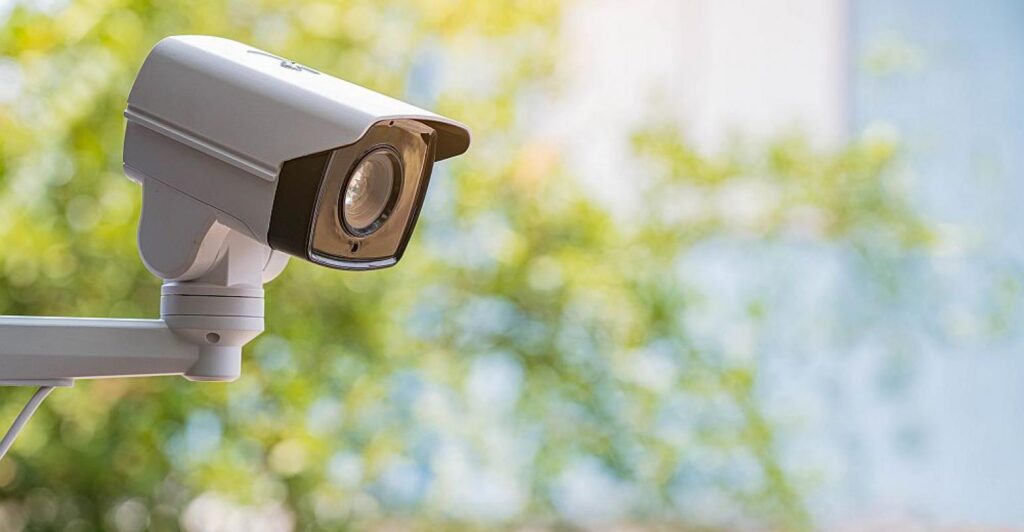
Effective emergency response and crisis management systems are critical for mitigating risks and minimizing the impact of unforeseen events. These systems ensure quick, coordinated efforts among various entities including fire, police, and medical personnel during critical situations.
Coordinating with Law Enforcement
In the case of a security breach or criminal incident, having a predetermined protocol for coordinating with law enforcement is essential. Communication channels should be established in advance to facilitate swift cooperation between the facility’s security personnel and the police.
Plans may include the use of direct lines, pre-scheduled check-ins, and real-time sharing of surveillance data.
Fire Safety and Evacuation Procedures
To handle fire emergencies, it is important to install and maintain smoke alarms and adhere to stringent fire safety and evacuation procedures. Emergency plans should outline clear evacuation routes, roles for staff in guiding occupants to safety, and regular drills.
Additionally, the presence of carbon monoxide detectors in appropriate areas ensures early detection of this invisible hazard, prompting evacuation and preventing poisoning.
Handling Medical and Hazardous Emergencies
For medical and hazardous emergencies such as accidents or exposure to harmful substances, protocols should be in place for immediate response. This involves training personnel in basic first aid, the use of automated external defibrillators (AEDs), and having clear procedures for hazardous material containment.
Quick and organized medical response can prevent escalation and ensure those affected receive immediate care.
Preventing Loss and Ensuring Continuity
Effective security systems are critical for the dual objectives of preventing loss of sensitive data and ensuring business continuity. Strategic planning and deployment of advanced tools play a pivotal role in protecting organizational assets and maintaining operations during disruptive events.
Loss Prevention Strategies
Organizations must adopt a multi-layered approach to safeguard their assets, including physical and digital measures. Employee training is vital in fostering a culture of security awareness, ensuring that every team member can identify and respond to potential breaches.
Technologies such as data loss prevention (DLP) software help monitor and control data transfer, guarding against unauthorized access.
Business Continuity Planning
A robust business continuity plan (BCP) is essential for any organization to maintain operations in the face of disruptions. This involves risk assessments and developing protocols that minimize downtime and facilitate the quick restoration of services.
These plans must be regularly updated and tested to respond effectively to evolving threats.
Data Protection and Cybersecurity Measures
To ensure the integrity of sensitive data, organizations should implement comprehensive cybersecurity policies that encompass both prevention and response strategies. Key measures include firewalls, intrusion detection systems (IDS), and access controls.
Consistent monitoring and immediate response to threats are imperative to prevent data breaches and maintain trust.
Conclusion
Importance of Security Systems
The significance of security systems is underscored by the diverse threats constantly evolving in the digital landscape. These systems serve as a fundamental defense for both individuals and organizations, safeguarding sensitive information and preserving operational integrity. They are instrumental in detecting vulnerabilities, providing real-time monitoring, and responding to cyber incidents.
Security measures must evolve in tandem with the increasing sophistication of cyber threats. Proactive steps and continuous improvement in security protocols are crucial to stay ahead of malicious entities. Implementing robust security systems is not an option, but a necessity in today’s interconnected world.
Consistent investment in cybersecurity measures is essential to protect digital assets and maintain user trust. The protection extends beyond mere data confidentiality to include the availability and integrity of systems — all pillars that are essential for a secure and reliable digital environment.
Frequently Asked Questions
Selecting the right security measures is crucial for safeguarding assets and ensuring safety. Properly implemented security systems can deter crime, monitor activities, and provide evidence if needed.
What is the benefit of security in the system?
The presence of security systems in homes and businesses significantly reduces the likelihood of criminal targeting due to the increased risk of detection and apprehension. Criminals are often deterred from attempting entry when they are aware of the enhanced security measures.
What are the primary benefits of having a security system in place?
The primary benefits include deterrent of criminal activity and the ability to monitor premises in real-time. A well-integrated system can also accelerate response times during emergencies.
Why is the security and safety system important?
Workplace security protects your staff and office environment from potential dangers. It’s essential for your security plan to shield your company’s sensitive data and information against cyber threats and hackers.
How do security systems enhance safety in commercial properties?
They ensure controlled access and help in maintaining detailed logs of people entering or leaving the property. Additionally, they act as a preventive measure against unauthorized access and can alert authorities in case of security breaches.
What components are crucial for an effective security system?
Critical components of a robust security system include high-resolution cameras, motion detectors, and secure access controls. Alarm systems and cybersecurity measures are also essential to protect data and network integrity.
Is a home security system a worthwhile investment for homeowners?
A home security system can greatly increase personal safety and potentially decrease insurance premiums. It provides homeowners peace of mind through continuous monitoring and alert systems.
How have modern advancements in technology impacted the efficiency of security systems?
Advancements such as artificial intelligence, machine learning, and cloud computing have significantly increased the efficiency of security systems. These technologies have improved threat detection capabilities and have streamlined security management.
What are the potential drawbacks of installing a home security system?
Potential drawbacks can include the complexity of installation, the need for regular maintenance, and the possibility of false alarms. Privacy concerns are also an issue if the security system is not properly secured against cyber threats.
